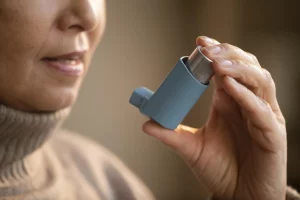The atopic triad is a term used to describe the three most common atopic diseases: asthma, hay fever, and eczema. These three conditions are often seen together in people who have an atopic tendency. This tendency may happen due to a combination of genetic and environmental factors.

Causes of Atopic Triad
People with atopic disease often have sensitivities to allergens such as pollen, dust mites, and animal dander. They may also have a family history of atopy or be more prone to developing atopic conditions if they have other medical conditions such as allergies or asthma.
The exact cause is unknown but may be due to a combination of genetic and environmental factors. There is no cure for these conditions, but people can manage them with medication and lifestyle changes. Treatment focuses on relieving symptoms and preventing flare-ups.
If a person has any of the following symptoms, they should see their doctor:
– Shortness of breath
– Wheezing
– Chest tightness
– Coughing
– Difficulty breathing
-Itchy, watery eyes
– Runny nose
– Sneezing
– Itchy nose, mouth, or throat
– Skin rash or hives

If a person has any of the following symptoms, they should seek emergency medical care:
– Shortness of breath that is getting worse
– Wheezing that is getting worse
– Chest tightness that is getting worse
– Difficulty breathing
– Skin rash or hives that are spreading
– Swelling of the face, lips, tongue, or throat
– Trouble swallowing
– Wheezing that sounds like a musical instrument
– Severe shortness of breath
– Rapid heartbeat
– Lightheadedness or dizziness
– Anxiety or panic attacks
Samter’s Triad vs. Atopic Triad
While the atopic triad is the most common presentation of atopic diseases, another group of conditions known as samter’s triad can also occur. Aspirin-exacerbated respiratory disease (AERD), formerly known as Samter’s Triad includes asthma, rhinitis, and aspirin intolerance. This condition may happen due to a sensitivity to aspirin and other non-steroidal anti-inflammatory drugs (NSAIDs).
There are some similarities between atopic disease and AERD, but there are also some critical differences. A combination of three chronic diseases characterizes both groups of conditions. However, the specific requirements that make up each group are different.

The triad includes asthma, hay fever, and eczema. These conditions may occur due to an overreaction of the immune system. AERD, on the other hand, includes asthma, rhinitis, and aspirin intolerance. Aspirin intolerance may happen due to a sensitivity to aspirin and other NSAIDs.
Another difference between the two groups of conditions is that people with AERD often have symptoms triggered by exposure to aspirin or other NSAIDs. People with atopic disease may also have allergic reactions to certain substances, but these reactions are not typically triggered by exposure to aspirin or other NSAIDs.
Finally, treatment for atopic conditions and AERD can differ. People with AERD may need to avoid aspirin and other NSAIDs, while people with atopic disease may need to avoid allergens that trigger their symptoms.
Treating Atopic Triad
There is no cure for atopic conditions, but there are treatments that can help to control symptoms. Avoiding triggers is often the first line of defense against atopic diseases. For example, people with atopic eczema may need to avoid irritants such as harsh soaps or detergents. People with atopic asthma may need to avoid allergens that trigger their asthma attacks.
In some cases, medications may be necessary to control symptoms. Corticosteroids are often used to treat inflammation associated with atopic conditions. Antihistamines treat itching and sneezing associated with hay fever. Bronchodilators treat asthma attacks.
Proper skin care can help to prevent or control eczema flare-ups. This routine includes using gentle cleansers and moisturizers and avoiding excessive scratching. People with atopic conditions should also be sure to practice good skin care.



